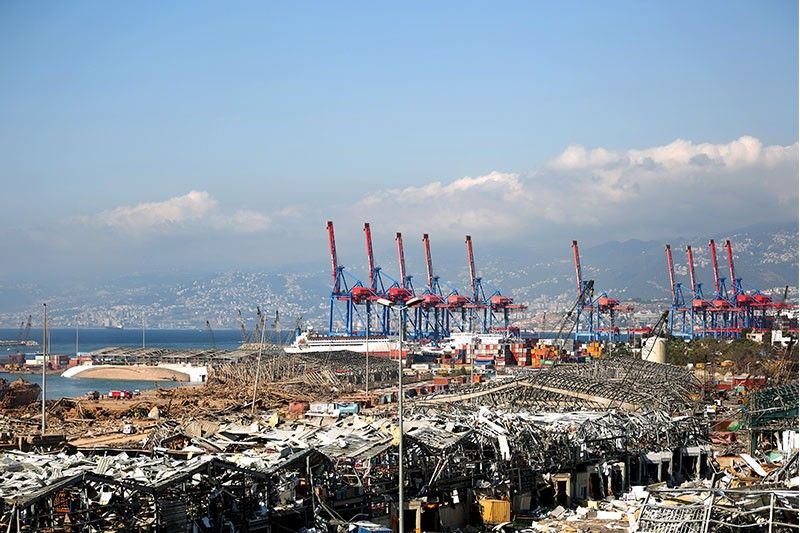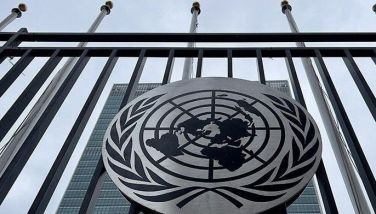What we know about the Lebanon explosions

BEIRUT, Lebanon — The mega-blast that tore through Lebanon's capital Tuesday with the force of an earthquake, killing at least 113 people and injuring over 4,000, resulted from the ignition of a huge depot of ammonium nitrate at Beirut's port, officials say, but many questions remain.
Here is what we know so far:
What happened?
An initial large explosion shook Beirut's port area at around 6:00 pm (1500 GMT) on Tuesday, resulting in a fire, several small blasts and then a colossal explosion that flattened the harbour front and surrounding buildings.
Seismologists measured the event, which blew out windows at the city's international airport nine kilometres (more than five miles) away, as the equivalent of a 3.3-magnitude earthquake.
Video stills show an intense blazing fireball rising above a line of massive storage silos, then a billowing cloud towering into the sky as a powerful shockwave rips through Lebanon's largest city.
Why such a big blast?
Lebanon's Prime Minister Hassan Diab said 2,750 tonnes of fertiliser ammonium nitrate stored in a portside warehouse had blown up, sparking "a disaster in every sense of the word".
Ammonium nitrate is an odourless crystalline salt that has been the cause of numerous industrial explosions over the decades.
When combined with fuel oils, it creates a potent explosive widely used in the construction industry, but also in homemade bombs such as those used in the 1995 Oklahoma City attacks.
Many European Union nations require ammonium nitrate to be mixed with calcium carbonate to make a safer compound.
Regulations in the United States were tightened significantly after the Oklahoma City bombing, which used two tonnes of ammonium nitrate and killed 168 people.
US facilities that store more than 2,000 pounds (0.9 metric tonnes) of ammonium nitrate are subject to inspections.
Why was the fertiliser stored at the port?
A security official said on condition of anonymity the ammonium nitrate had arrived in Lebanon in 2013 on board a Moldovan-flagged ship sailing from Georgia and bound for Mozambique.
According to Lebanese law firm Baroudi & Associates, which represents the crew of the "Rhosus", it had faced "technical problems".
Several security officials told AFP that it temporarily docked at the port but was later seized by authorities after a Lebanese company filed a lawsuit against its owner.
Port authorities unloaded the ammonium nitrate and stored it in a rundown port warehouse with cracks in its walls, the officials said.
Security forces launched an investigation in 2019 after the warehouse started to exude a strange odour, concluding the "dangerous" chemicals needed to be removed from the premises, but action was not taken.
This week workers began repairs on the decrepit warehouse, causing speculation that might have triggered the blast.
Who is to blame?
Lebanese port authorities and customs officials knew the chemical was being stored in the port, but despite warnings, action was not taken to remove it.
Diab's government described the circumstances at the port that led to the explosion as "unacceptable" and vowed to investigate.
It said later Wednesday it would seek house arrest for all officials involved in storing the substance.
Fuelling the confusion, US President Donald Trump said late Tuesday that US generals had told him the explosions appeared to have been caused by a "bomb of some kind", without offering evidence.
But a Pentagon spokesman, when asked about the president's remarks, told AFP that "we don't have anything for you" and "you will have to reach out to the White House for clarification."
How many casualties?
The blasts killed at least 113 people and injured over 4,000, Health Minister Hamad Hassan said Wednesday afternoon, the latest update of the toll.
Dozens of people are missing.
Search and rescue teams are still sifting through areas surrounding the port, with rubble from flattened buildings spread across a wide area.
People were injured across the city, with glass blown out of buildings, cars destroyed and according to the city governor, up to 300,000 left homeless.
What happens next?
Lebanon's national defence council has declared Beirut a disaster zone.
President Michel Aoun has announced he will release 100 billion lira ($66 million, 55 million euros) of emergency funds.
But the country is in the middle of an enormous economic crisis and its hospitals are already overwhelmed by the coronavirus pandemic.
Several nations including the US, France, Jordan, Iran and even Lebanon's arch foe Israel have offered to send aid.
Some, including mobile hospital from Qatar, rescuers from Greece and medical supplies from Kuwait, have begun to arrive.
The powerful explosions that rocked the port of Beirut on Tuesday left "people dead and injured", the Lebanon's National News Agency reports
Georges Kettaneh, the president of the Lebanese Red Cross, referrs to "hundreds of wounded" in a statement on Lebanese LBC television, adding: "We are overwhelmed by phone calls."
Lebanon’s Prime Minister Hasan Diab has declared Wednesday a day of mourning, and President Michel Aoun called for "urgent" defence council talks. — AFP
The Lebanese judge leading an investigation into last year's devastating Beirut port blast was forced to suspend his work Tuesday after what human rights groups condemned as an attempt by politicians to evade justice.
It is the second time that judge Tarek Bitar has had to suspend the probe in the face of lawsuits filed by former ministers he had summoned on suspicion of negligence, and it comes amid growing calls from top officials, including Hezbollah chief Hasan Nasrallah, for him to be replaced.
Bitar's predecessor, Fadi Sawan, was forced to suspend his probe for the same reason before he was finally removed in February in a move widely condemned as political interference. — AFP/Rouba El Husseini
Lebanese leaders have promised to form a new government within two weeks, visiting French president Emmanuel Macron said Tuesday after talks with political blocs who designated a new prime minister a day earlier.
"What I have asked for, what all political parties without exception have committed to this evening right here, is that the formation of this government will not take more than 15 days," Macron said in a speech.
He said the cabinet would be comprised of "competent personalities" and would be an "independent" entity with the backing of political parties. — AFP
UN human rights experts on Thursday demanded a swift, independent investigation into the catastrophic Beirut explosion, citing deep concern about irresponsibility and impunity in Lebanon.
The group also called for a relatively-rare special debate at the United Nations Human Rights Council this September.
UN experts do not speak for the United Nations but report their findings to it. — AFP
The massive blast at Beirut port on August 4 caused more than $15 billion in damages, Lebanese President Michel Aoun says.
"Preliminary estimates of the losses suffered following the port explosion top 15 billion dollars," he was quoted as telling Spain's King Felipe in a phone call, in a message on the presidency's Twitter account. — AFP
The death toll from Beirut's massive August 4 explosion has climbed to 171, a health ministry spokesman told AFP on Tuesday.
The new figure, up from 160, came exactly one week since the mega-blast ravaged swathes of the Lebanese capital, wounding more than 6,000 and temporarily displacing 300,000 people from their homes. — AFP
- Latest
- Trending



































